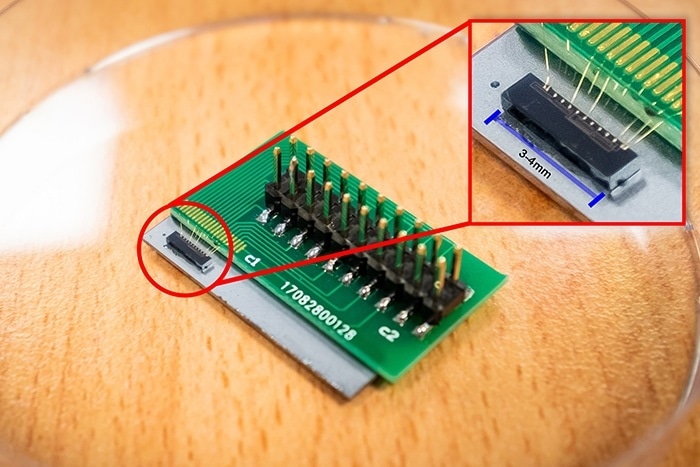Nov 4 2019
Scientists from Nanyang Technological University, Singapore have created a quantum communication chip that measures 1000 times smaller compared to existing quantum setups, but provides the same outstanding security for which quantum technology is famous.
 Roughly about 3 mm in size, the tiny chip developed by NTU scientists uses quantum communication algorithms to better security than existing industry standards. It also opens doors for more secure communication technologies that can be deployed in compact devices such as smartphones, tablets, and wearables. (Image credit: Nanyang Technological University, Singapore)
Roughly about 3 mm in size, the tiny chip developed by NTU scientists uses quantum communication algorithms to better security than existing industry standards. It also opens doors for more secure communication technologies that can be deployed in compact devices such as smartphones, tablets, and wearables. (Image credit: Nanyang Technological University, Singapore)
A majority of the pioneering security standards employed in secure communication methods—from cash withdrawal at the ATM to buying goods online over the smartphone—do not leverage quantum technology. It is feasible to intercept the electronic transmission of the password or personal identification number (PIN), posing a security risk.
The small chip designed by NTU scientists measures roughly 3 mm and uses quantum communication algorithms to offer better security than current standards. It achieves this by combining passwords in the information being delivered, developing a secure “quantum key.” Once the information is received, it is destroyed together with the key, thus enabling a highly secure form of communication.
Moreover, it requires 1000 times less space compared to existing quantum communication setups that can have a size equivalent to that of a refrigerator or even occupy the space of an entire room or office floor.
This paves the way for more secure communication technologies that can be used in compact devices like smartphones, smartwatches, and tablets. It also forms the basis of improved encryption techniques for electronic communication and online transactions.
Under the guidance of NTU Professor Liu Ai Qun, and Associate Professor Kwek Leong Chuan, the study outcomes have been published in Nature Photonics, a leading peer-reviewed journal.
In today’s world, cyber security is very important as so much of our data are stored and communicated digitally. Almost all digital platforms and repositories require users to input their passwords and biometric data, and as long as this is the case, it could be eavesdropped on or deciphered. Quantum technology eliminates this as both the password and information are integrated within the message being sent, forming a ‘quantum key’.
Liu Ai Qun, Professor, School of Electrical and Electronic Engineering, Nanyang Technological University, Singapore
According to Kwek, quantum communication works by exploiting randomized strings of code for encrypting information that can only be opened by the targeted recipient with the accurate “key.” Biometric data or additional passwords need not be transmitted, which is typical to existing forms of communication.
It is like sending a secured letter. Imagine that the person who wrote the letter locked the message in an envelope with its ‘key’ also inside it. The recipient needs the same ‘key’ to open it. Quantum technology ensures that the key distribution is secure, preventing any tampering to the ‘key’.
Kwek Leong Chuan, Associate Professor and Physicist, National Institute of Education, Nanyang Technological University, Singapore
Military-Grade Communication Tech, Made Cost-Effective
The leading tech companies across the globe, like IBM and Google, are competing to create quantum supercomputers that would transform computing at speeds that are inconceivable at present.
A highly expected strength of quantum technology is embedded in cryptography, the skill of secret communication.
The growth of Internet services has enabled emails and messaging platforms like Facebook, WhatsApp, Skype, Telegram, Snapchat, etc. to develop their own secured channels for communication—the so-called “classical channels.”
On the other hand, “quantum channels” carrying information include security protocols that are combined with the encrypted data. The channels are distinctively different from one another, thus minimizing or even totally avoiding the risk of interception and leak of information during transmission.
In other words, quantum technology eliminates the need for additional transmissions of biometric data or passwords that is essential in “classical channels.” This removes the risk of interception or leak of information, thus forming a virtually unbreakable encryption.
The quantum communication chip designed by the NTU scientists will be cost-efficient as it employs standard industry materials like silicon, which also renders it easy to produce.
This is the future of communication security and our research brings us closer to quantum computing and communication. It will help spark the creation of next-generation communication devices, as well as enhance digital services such as online financial portals of banks, and digital government services.
Liu Ai Qun, Professor, School of Electrical and Electronic Engineering, Nanyang Technological University, Singapore
Currently, the NTU researchers are looking to design a hybrid network of conventional optical communication systems and quantum communication systems. Consequently, the compatibility of quantum technologies that can be applied to a more extensive range of applications (for example, internet connectivity) will be enhanced.